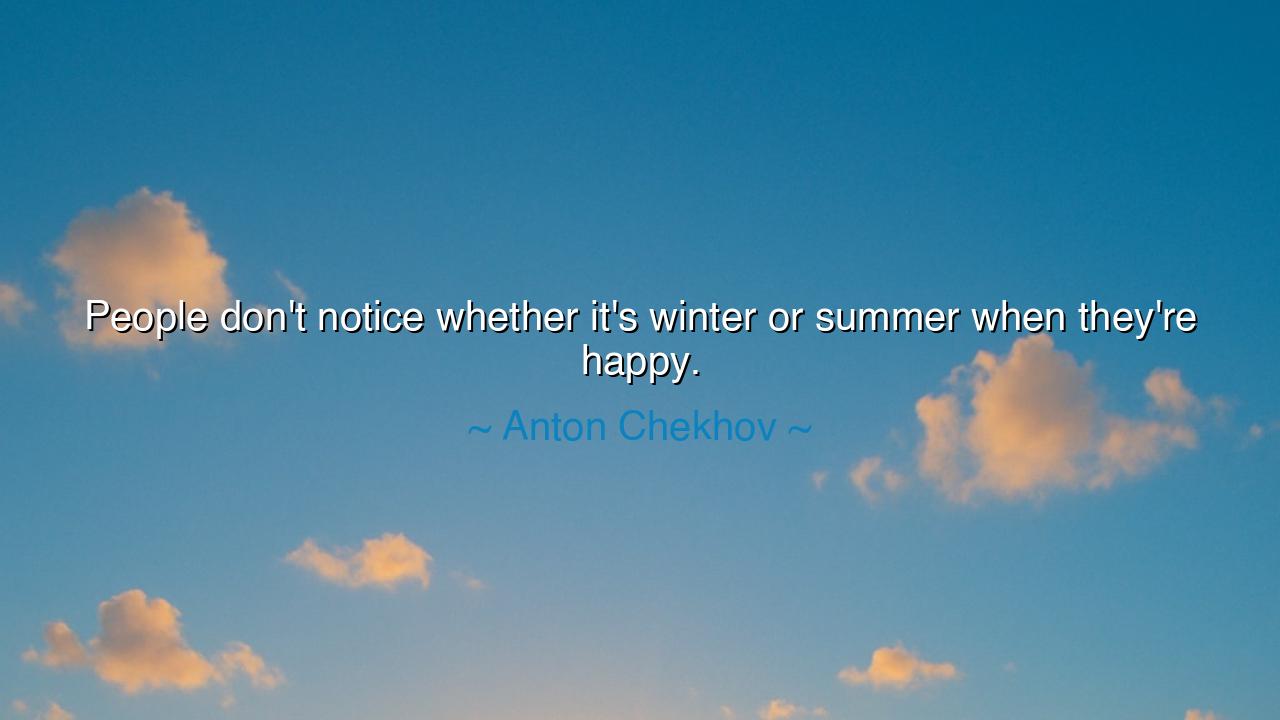
People don't notice whether it's winter or summer when they're






"People don’t notice whether it’s winter or summer when they’re happy." Thus wrote Anton Chekhov, the physician of souls, who knew both the frailty and the quiet strength of the human heart. His words uncover a mystery as old as life itself: that joy lifts man above the weight of circumstance. For when the spirit is filled with happiness, the harshness of winter and the heat of summer lose their sting, and the soul dwells in a season of its own.
The ancients spoke of this truth in their parables. The Stoics taught that the wise man carries within him a kingdom untouched by fortune, where neither frost nor drought can trouble him. For true happiness is not chained to the turning of the seasons but springs from within, where the fire of the heart burns brighter than the sun. To the man content in love, friendship, or virtue, winter is but a cloak, summer but a breeze.
Consider the life of Helen Keller. Stripped of sight and hearing, she might have dwelt forever in a world of shadows, yet through learning, friendship, and love, she discovered happiness. In her joy, she no longer felt her deprivation as a curse. Seasons mattered little; what defined her days was the warmth of her spirit. Her life became a testament that happiness is stronger than any storm or season.
So too in the trenches of war, men have sung songs in the bitter cold of winter, or laughed in the searing summer heat, because in those fleeting moments of fellowship, they were happy. Misery turned to endurance, suffering turned to memory, all because joy gave them strength to transcend what the body endured. Chekhov, who himself lived amid hardship, knew this hidden power of the heart.
Therefore, let it be taught: do not look to the seasons to govern your joy, for happiness is a season of its own. He who waits for fair weather may never rejoice, but he who learns to kindle light within will find summer in the midst of winter, and spring even in the darkest of nights. For true happiness is eternal sunshine of the soul.






LVHOANG LE VY
Practical question: if mood buffers perception, can we engineer more buffer without toxic positivity? What would a “weather-agnostic happiness toolkit” include—indoor hobbies that induce flow, light exposure protocols, exercise routines with rainy-day variants, and social commitments that survive cancellations? I’d like a simple template: plan A for ideal conditions, plan B for disruptions, and a reflection prompt to salvage meaning when plans change. How do we measure whether this toolbox actually works—journal markers, sleep quality, or fewer canceled goals?
TDdao tien dat
I’m thinking about relationships. Early infatuation often makes inconveniences feel quaint; later, the same hassles strain patience. How do couples and close friends intentionally cultivate shared joy that’s resilient across weather swings and life stressors? I’d love concrete rituals: seasonal bucket lists, rotating host duties, micro-celebrations after errands, and a rule for naming needs before irritability peaks. Are there proven practices—like gratitude exchanges or novelty dates—that keep attention on connection rather than external discomforts, without pretending circumstances never affect moods?
PHPhat Huan
Social context matters. It’s easier to ignore harsh weather when you have insulation, reliable transit, flexible work, or paid time off. For someone in precarious housing or outdoor labor, conditions are not background—they’re survival variables. Could you weigh the class dimension here and suggest civic practices that make contentment less dependent on privilege—warming centers, shaded corridors, sick-leave policies, neighborhood mutual aid? I’m asking for a perspective that preserves the insight about inner joy while refusing to erase material inequalities.
BAngo binh an
Another angle: is indifference to the calendar a sign of presence or avoidance? Flow can make hours blur because we’re engrossed; numbing can make cues fade because we’re disconnected. How do we tell which one we’re experiencing? I’d appreciate a diagnostic checklist: energy after the activity, memory richness, openness to feedback, and whether responsibilities still get met. If the blur leaves us restored and aligned with values, great. If it leaves us foggy and behind, maybe the bliss is closer to escape.
VTVy Thai
I flinch at the romanticism because for many, seasons aren’t optional backdrops—they’re biological drivers. Seasonal affective disorder, chronic pain that flares in cold, heat sensitivity—these realities complicate neat claims about joy overriding climate. How should we honor bodies that react to light and temperature while still pursuing meaning? Could you offer a compassionate framework that pairs treatment options (light therapy, pacing, hydration strategies) with psychological tools (behavioral activation, social connection), so people aren’t shamed for noticing their symptoms when life is otherwise good?